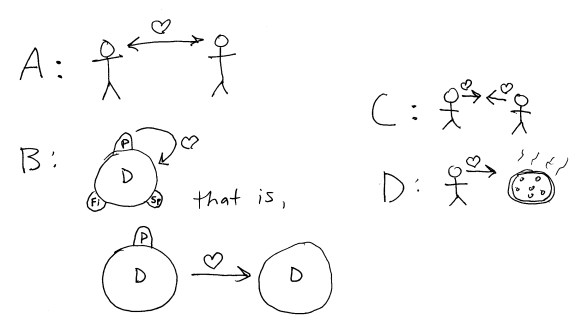Kimel’s review of What is the Trinity – Part 4
The real question, I think, is whether or not this idea about “God” is consistent with biblical teaching.
The real question, I think, is whether or not this idea about “God” is consistent with biblical teaching.
Dallas Willard is one of my favorite authors, and I don’t normally go in for criticizing what he writes. But I found a great example in this (good) book (p. 122) of an idea that is fairly widespread, and which underlies a lot of social trinitarian speculation. This brief passage got me to thinking. He says, …God is love and sustains love for us from… Read More »Are persons essentially relational?
Another take on James White’s arguments that Jesus is Yahweh.
Still waiting for substantial replies to my Challenge to evangelical “Jesus is God” apologists. Some have worried that the meaning of “God” is somehow problematic here. There is an ambiguity here, but it is deliberate, and is a virtue of the argument. You can take “God” here to be either the Father (as in the NT) or the Trinity (as in trinitarian traditions) – either… Read More »“God” in the Challenge argument
Do I ignore “the” being/Person distinction?
One’s theology can lead one to deny obvious facts about the New Testament.
Andrew Davis on the church fathers, the Bible, and finding his way through clashing theologies.
Most Orthodox theologians agree with Catholics and most Protestants that the one God is the Trinity.
I Can’t Stop Loving You – actually, it’s worse than that – I can’t not love you!
Alexander Pruss is an excellent philosophy of religion dude at Baylor. His second PhD dissertation was on possible worlds. Don’t ask me to explain what his first one was on! 🙂 He’s got about a million original ideas on almost as many topics, a lot of which get posted at his creatively-titled blog, Alexander Pruss’s Blog 🙂 as well as at The Prosblogion.
He recently weighed in (comments #8-9) on my attempted argument against social trinitarian arguments. Here are the most relevant bits:Read More »Pruss on essentially loving beings

Four vivid, moving, memorable depictions of Love.
A post on some previous post commentary – no one can navel-gaze like a philosopher! 🙂 Here’s a pictorial recap, and some additional thoughts on the comments here, in response to Scott and JT. The point of all this: we’re exploring why people who call themselves “social trinitarians” don’t like what they call “Latin” theories, and specifically the claim that those “Latin” theories can’t do justice to the loving relationships between the persons of the Trinity.Read More »on interpersonal love and stick figures (Dale)
A pound of misunderstanding and irrelevance together with a little pinch of relevant but inadequate response.
The Social Trinity may be more social than you thought. In this episode I talk with trinities contributor Mr. Chad McIntosh about his new twist on a “social” Trinity theory – that not only are there three divine persons or selves, but in another but related sense, the Trinity is a person, what he calls a functional person.
Reading the gospel of John in its first-century context is eye-opening!
Is God a self – a being capable of consciousness, knowledge, and choice, like us, but infinitely greater? Or is God a community, or a something-we-know-not-what? Dr. Holmes’s language in his book The Quest for the Trinity made me think that he would answer: yes, God is a self, and not a community, or a mysterious Something. I took him to be a one-self trinitarian, and… Read More »podcast 43 – Dr. Stephen R. Holmes on God and humankind
Kimel lampoons the biblical unitarian historical narrative, and urges that Irenaeus is a big problem for it.
This time, some questions that may occur to you about Clarke’s views on the Trinity.
 Princeton philosopher Thomas Kelly in a paper on the epistemology of disagreement (i.e. what the reasonable response when we find the people just as smart and informed etc. as us disagree on some important matter):
Princeton philosopher Thomas Kelly in a paper on the epistemology of disagreement (i.e. what the reasonable response when we find the people just as smart and informed etc. as us disagree on some important matter):
In principle, we ought to be able to give due weight to the available reasons that support a given view, even in the absence of actual defenders of the view who take those reasons as compelling. But in practice, the case for a view is apt to get short shrift in the absence of any actual defenders. The existence of actual defenders can serve to overcome our blindspots by forcefully reminding us just how formidable the case is for the thesis that they defend… But the case for a given view itself is no stronger in virtue of the fact that that view has actual defenders…
Thomas Kelly, ” The Epistemic Significance of Disagreement,” p. 31 (in pre-print).
At first this reminded me of a proverb I’ve often thought of when reading some catholic theologian who has evidently never put the slightest effort into understanding the overall case for unitarianism:
“The first to speak in court sounds right–until the cross-examination begins.” Proverbs 18:17 (NLT)
But this is actually a different point than Kelly’s. A better courtroom analogy for Kelly’s point is:Read More »Arguing against no one
A podcast listener recently emailed me to ask (emphases added): I won’t hide that I’m a happy Trinitarian and yet that I’m thoroughly enjoying your podcast since it provokes my theology and forces me to actually think about why I believe what I believe. This is a healthy check I think. I am puzzled though about why the numerical issue is so important. If Jesus… Read More »reader question on the Trinity and numerical sameness